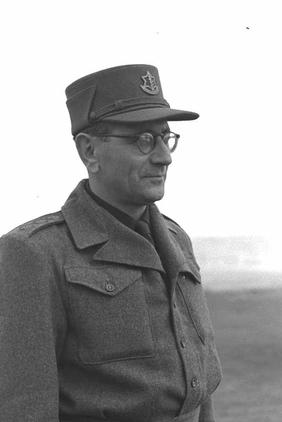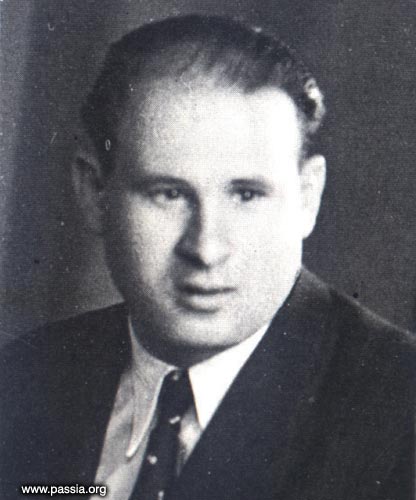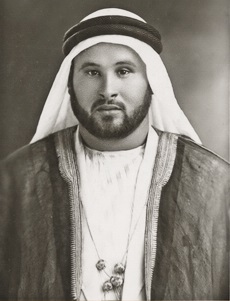<Back to Index>
- Commander of the Haganah David Shaltiel, 1903
- Commander of the Palestinian Holy War Army Hasan Salameh, 1912
PAGE SPONSOR

David Shaltiel (hebrew: דוד שאלתיאל, b. 16 January 1903 Berlin - February, 1969 Jerusalem) was an Israeli military and intelligence officer, later also diplomat, and was best known for being the district commander of the Haganah in Jerusalem during the 1948 Arab - Israeli war.
He was born in Berlin into a Portuguese orthodox Jewish family
settled in Hamburg. At 16, Shaltiel joined the Zionist youth movement
Blau Weiss,
and he went to Palestine in 1923. However, he was not happy there, and
returned to Europe in 1925. From 1925 - 1930 he was enlisted in the
French Foreign Legion. In 1934 he returned to Palestine. There he
started working for the Haganah, being charged with buying arms in
Europe. In 1936 he was captured in Aachen, Germany, by Gestapo. Shaltiel
spent the three next years in prisons/ concentration camps, including
Dachau and Buchenwald. When he was sent to Berlin in 1939 the Haganah succeeded in freeing him.
He then went back to Palestine. There he was at first condemned to death for murder by the British, but a British War Council later acquitted him. In 1942 - 43, he was the Haganah Commander in Haifa. Fulfilling also the office of commander of the Counterintelligence service - the "Ran" - and of the Intelligence Service - the Shin Yud - of the Haganah, he was involved in the conflicts between the Haganah and the other Jewish underground groups - Irgun and Lehi. Later, as Haganah's link to these organizations, Irgun, helped them coordinate several missions with the Haganah. Among them the widely condemned attack at Deir Yassin. In 1948, he was the local Haganah district commander when the village was attacked by Irgun and Lehi Jewish fighters despite a non - aggression pact signed between the Zionists and the Mukhtar of the village, the villagers wanting to remain neutral in the war. At first Shaltiel did not agree with attacking Deir Yassin, but after a day he surrendered and wrote a letter to them saying that he had "no objection to your carrying out the operation". Yitzchak Levi, head of the Jerusalem branch of Haganah Intelligence, proposed that the inhabitants should be notified that the truce was over, but Shaltiel then refused to endanger the operation by warning them.
He was also the mastermind behind Operation Kedem, which had the goal of capturing "East Jerusalem". The mission was carried out July 8, 1948 by Irgun troops and was a total failure. From that moment, he was, (according to himself), disgraced and his name was erased from official Israel history.
Between June 11 and July 21, 1948, he had a series of meetings, mediated by the UN, with Abdullah el Tell, the commander of Arab Legion troops in the Old City.
On July 7 they signed the "Mount Scopus Agreement" which stated that the Jewish enclave at Mount Scopus should be de-militarized and would come under UN supervision. On July 15 the Haganah and Irgun launched a massive bombardment on the Old City which was followed by infantry attacks on the New, Jaffa and Zion Gates. These failed to achieve their objectives. On 21 July Shaltiel and el Tell signed a formal cease-fire based on the existing positions of their forces.
After the end of the Independence War, David Shaltiel founded the Border Corps of the Israeli army, the Heyl Hasfar, and was its first commander. Later, because of administrative problems, he recommended to transfer these units into the frame of the Israeli Police, then they became known as Border Guard - Mishmar Hagvul. In the years 1950 - 1952 Shaltiel served as military attaché of Israel in France and later fulfilled several diplomatic charges - as Israel's plenipotentiary minister in Brazil and Venezuela (1952 – 1956), then in Mexico (1956 – 1959) and ambassador in the Netherlands (1963 – 1966). Shaltiel died in Jerusalem in 1969.
Shaltiel was married twice - with Inge, then in 1942 with Yehudit,
born Judith Irmgard Schonstedt (1913 – 2010), psychologist, daughter of a
family of rabbis from Berlin. A little girl,Tamar,
adopted by him and his second wife, had to be returned to her biological
mother.


Hasan Salama or Hassan Salameh (Arabic: حسن سلامة, Ḥasan Salāmah) (1913 – June 2, 1948) was a commander of the Palestinian Holy War Army (Jaysh al-Jihad al-Muqaddas, Arabic: جيش الجهاد المقدس) in the 1948 Arab - Israeli War along with Abd al-Qadir al-Husayni.
Salama was born in the Palestinian village Qula in 1912. Salama was one of the leaders of the armed Arab groups whom fought against the Jews and British during the 1936 – 1939 Arab revolt in Palestine. After the Arab revolt in Palestine Salama fled to Lebanon, and then fled along with the Mufti of Jerusalem Hajj Amin al-Husseini to Iraq.
In November 1941 Salama moved to Nazi Germany with a group of sixty Arab nationalists led by Nazi collaborator Hajj Amin al-Husseini. He returned to the region of Palestine in October 1944 during the covert joint Nazi - Palestinian Operation ATLAS, which was aimed at poisoning the drinking water resources of the city of Tel Aviv in order to kill the 160 thousand Jewish residents of the city. The operation eventually failed and Salama got seriously wounded during the parachuting and took refuge in Jerusalem. Nevertheless, Salama managed to get his injury treated by a doctor in Qula.
The Holy War Army was a force of Palestinian Arab irregulars in the 1947 - 48 Palestinian civil war. The force has been described as Abd al-Qadir al-Husayni's "personal" army.
Salama was a member of the Palestine Arab Party.
At the meeting held in Damascus on 5 February 1948, to organize the Palestinian Field Commands, Salama was allocated the Lydda district.
Salama was killed by the IDF in the battle of Ras al-Ein on 2 June 1948. He was the father of Ali Hassan Salameh.